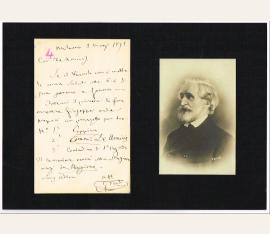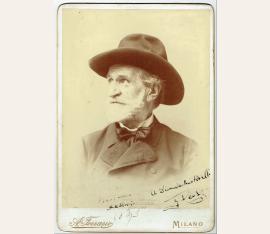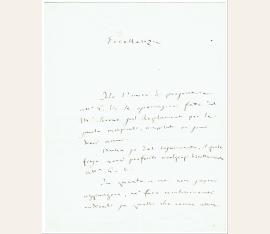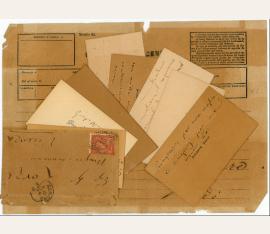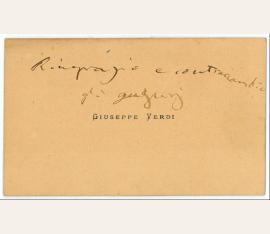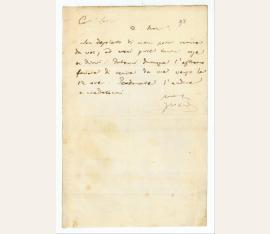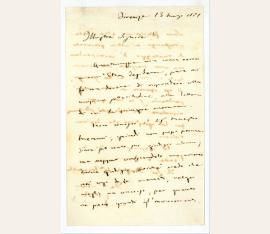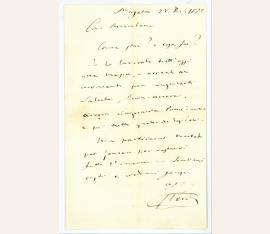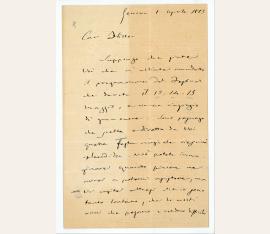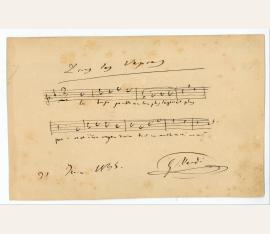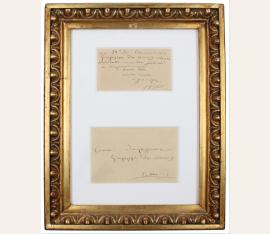Komponist (1813–1901). Eigenh. Brief mit U. ("GVerdi"). Mailand. 1 S. 8vo. Mit eh. adr. Kuvert.
9.500 €
(35042)
An den Schriftsteller Edmondo de Amicis. So der Teufel ihm keinen Strich durch die Rechnung mache ("se il diavolo non mette le corna"), werde er am Samstag um 6 Uhr abends in Genua sein; weiters über ein Programm, da de Amicis gestalten solle: "No. 1. Peppina, 2. Comm: De Amicis, 3. Contadino de St. Agata [...]". – Zusammen mit einer Portraitpostkarte in Passepartout (210:296 mm); mit zeitgen. Numerierung in rotem Farbstift.
ital. Komponist (1813–1901). Große Kabinettphotographie mit eigenh. Widmung und Unterschrift. o. O. 245 : 170 mm. Mit vierseitigem Goldschnitt.
8.500 €
(81368)
Schöne große Kabinettphotographie (fotografiert von A. Ferrario Milano) mit Unterschrift am rechten unteren Rand und der Widmung „A Diomede Martinelli G. Verdi | Febbrario 1895“. Der Komponist Giuseppe Verdi verbrachte den Februar 1895 in Mailand, um sich um Entwürfe des schon lange von ihm geplante „Casa di Riposo per Musicisti“ zu kümmern. Auf der Höhe seines Erfolges hatte Verdi gemeinsam mit seiner zweiten Frau, der Sängerin Guiseppina Strepponi (1815-1897), den Plan gefasst, ein Haus für alte und verarmte Musiker zu gründen - denn er hatte viele Künstlerschicksale gesehen, die in Armut und Elend endeten.
Anfangs wollten Verdi und seine Frau selbst mit in dem Haus leben, nach dem Tod seiner Frau gab Verdi diesen Gedanken auf. Vielmehr bestimmte er, dass das Haus erst nach seinem Tod eröffnet würde. Verdi legte die Aufnahmebedingungen für die Gäste fest: italienische Staatsangehörigkeit, ab einem Alter von 65 Jahren und nach mindestens 20 Jahren aktiver Tätigkeit im öffentlichen Musikleben nachweisbar arm. Um sein Werk für die Zukunft zu sichern, bestimmte Verdi, dass die Autorenrechte seiner Opern in allen Ländern der Welt bis zum 50. Jahr nach seinem Tod an das Casa di Riposo per Musicisti am Piazzo Michelangelo gezahlt werden. In seinen späten Jahren schrieb Verdi an seinen Freund Giulio Monteverde: „Delle mie opere, quella che mi piace di più è la Casa che ho fatto costruire a Milano per accogliervi i vecchi artisti di canto non favoriti dalla fortuna, o che non possedettero da giovani la virtù del risparmio. Poveri e cari compagni della mia vita!“ (Übersetzung: „Von all meinen Werken gefällt mir am besten das Haus, das ich in Mailand gebaut habe, um alte Gesangskünstler willkommen zu heißen, die nicht vom Glück begünstigt wurden oder die nicht die Tugend hatten, in jungen Jahren vorzusorgen. Arme und liebe Gefährten meines Lebens!“) Das Casa war nicht die einzige wohltätige Einrichtung, die Verdi ins Leben gerufen hat. 1888 hatte Verdi bereits ein Krankenhaus in Villanova sull’Arda unweit seines Wohnortes eingerichtet. Am 1889 verfolgte er den Plan des Casa di Riposo (was soviel heißt wie Altenheim), ein Plan, den der 1891 in einem Interview in der Gazetta musicale di Milano öffentlich machte. Der Bau begann 1896 und das Haus war 1899 fertig. Den gleichen Nachnamen wie der Empfänger der Photographie trägt Amilcare Martinelli, Giuseppina Verdis Anwalt und ihr Nachlassverwalter. Mit dem Namen Diomede Martinelli taucht zudem eine Gastroenterologe auf, der eine Studie veröffentlich hat..
ital. Komponist (1813–1901). Eigenh. Brief mit Unterschrift. Sant'Agata di Villanova. 4to. 2 1/2 pp.
4.800 €
(81643)
Ungewöhnlich attraktiver Brief Verdis zur Musikausbildung. Verdi hat die Ehre, die von Herrn Serrao durchgeführten Maßnahmen zu den Vorschriften für Musikschulen (“Regolamento per le scuole Musicale“) zehn Jahre lang vorzustellen. Er konnte nichts hinzufügen oder ändern. Es ist notwendig, einen Mann von sehr hohem Wert an die Spitze aller musikalischen Einrichtungen zu stellen (“un 'uomo di altissimo valore alla testa di ogni stabilimente Musicale“). In der Vergangenheit gab er Beispiele von Scarlatti, Leo, Durante und anderen für das Konservatorium von Neapel; von Pater Martini in Bologna, von Cherubini in Paris.
Er wünscht Seiner Exzellenz, dass es gelingt, nützliche Arbeit für die italienische Kunst zu leisten..
Komponist (1813-1901). Eigenh. Brief mit U. ("G. Verdi"). Mailand. 18.11.1845. 1½ SS. auf Doppelblatt. 8vo. Mit eh. Adresse.
7.500 €
(60935/BN44917)
In italienischer Sprache an seinen Pariser Verleger Léon Escudier: "I have received almost contemporaneously your very much valued letters. Lucca has assured me that you would have the preference of the Opera of London, and that this affair shall be definitively concluded when I and Lucca in April shall pass through Paris to go to London. As to the Opera, it suffices that you sustain me. I want to advise you that in the Carnival of 1847 I must write an Opera for L. which shall be performed in Rome, thus I could not make in that period another Opera.
For the present we must suspend this business, and the case wh shall speak of it when I shall be in Paris. Give me news of Ernania [...]" (aus der englischen Übersetzung). - Faltspuren; das Adressblatt gering eingerissen. Provenienz: Aus einer Chicagoer Privatsammlung..
Italian composer (1813-1901). 8 autograph calling cards, one holograph envelope, and one telegram. No place. Altogether 9 ff. and envelope.
7.500 €
(72735/BN46753)
All addressed to Count Andrea Zorzi, an eccentric Venetian nobleman from an ancient family and a supporter of Verdi; he is said to have owned a silver cane upon which the titles of each Verdi opera were engraved as he heard them. Most items with a short sentence or two: "ringrazio e contraccambio auguri di gran cuore". - Condition varies: some are browned; the telegram is chipped with some loss and toning.
Italian composer (1813-1901). Autograph calling card. No place. Calling card format. 1 page.
1.500 €
(72867/BN46939)
To the unnamed Count Andrea Zorzi, an eccentric Venetian nobleman from an ancient family and a supporter of Verdi (he is said to have owned a silver cane upon which the titles of each Verdi opera were engraved as he heard them): "Ringrazio e contraccambio gli auguri". - Mild toning.
Italian composer (1813-1901). Autograph letter signed. No place. 8vo. ½ page on bifolium. With autograph address on verso.
2.400 €
(86080/BN56807)
To his French publisher Léon Escudier (1821-81), regretting his being unable to visit him, but asking him to come to his place instead, as he has several things to tell him: "Son de plato di non poter venire da voi; ed avrei pure tante cose a dirvi. Fatemi dunque l'estremo favore di venire da me verse le 12 ore […]". - With former collector's number "98" in pencil. Traces of former mounting on reverse; address leaf with two marginal tears.
Italian composer (1813-1901). Autograph letter signed. Florence. 8vo. 2 pp. on bifolium.
3.000 €
(88562/BN58453)
To an "Illustre Signore" who has requested his aid in weighing the skill of a fellow composer. However, Verdi does not know the gentleman in question ("Non conosco il sig. Maestro Mercuri") and thus cannot pass judgement on him: instead, he suggests it would be better to have a contest in order to find a satisfactory answer. Verdi goes on to say that he is happy that these circumstances have given him the advantage of corresponding with a person who greatly honours Italy and science ("una persona, che onora tanto l'Italia e la scienza"), and he dares to hope that he will be forgiven for not having been able to answer more satisfactorily the question he was asked.
- The maestro in question was likely Agostino Mercuri (1839-92) who wrote several operas. His son later claimed in a biography of Mercuri that his father was familiar with many great musical names of his age, including Verdi, but perhaps this was an exaggeration, or refers to a later acquaintance after Mercuri wrote his most famous opera, "Adelinda", the year following this letter. - Gently creased along folds; subtle paper repair to small closed tear..
Italian composer (1813-1901). Autograph letter signed. Sant'Agata in Villanova sull'Arda. 8vo. 1 p., with accompanying envelope. Written in ink.
4.500 €
(88564/BN58455)
Verdi, hard at work on a composition, writes to Count Opprandino Arrivabene, "Io holavorato tutt'oggi alla messa", but that he wishes to "sospendo un momento per augurarti Salute, Buona amore", etc. The mass Verdi is composing in December 1873 may well be his Messa da Requiem, composed in memory of Alessandro Manzoni who had died that spring, and which would be first performed in May 1874. - Opprandino Arrivabene (1807-87) and Verdi were lifelong friends, and kept up a warm correspondence on subjects of music, politics, and private life. - Letter gently creased along folds, envelope lightly soiled with its date noted in pencil in a modern hand.
Italian composer (1813-1901). Autigraph letter signed ("G. Verdi"). Genoa. 8vo. 3 pp. on bifolium.
6.500 €
(88565/BN58456)
To the pianist and composer Ferdinand von Hiller (1811-85) concerning an invitation to the Lower Rhenish Music Festival and rumours about the composition of "Otello". Verdi assumes that it was Hiller who sent him the festival programme and thanks him warmly for it but declines an invitation to participate due to the distance, his age, and lack of time: "Voi potete immaginare quanto piacere ne avrei a potervi assistere; ma voi capite altresì che io sono tanto lontano, che ho molti anni che pegano e rendono difficili i viaggi, e che anche il tempo mi manca".
He will think of him during the festival, which will "bring back happy memories of joyful hours in your company", and asks Hiller to inform him about the "surely excellent result" upon its conclusion. After a few words about the weather and his plans to go to the countryside, Verdi goes on to deny rumours that might have reached Hiller about having written "Otello": "Caso mai aveste sentito dire che io st. facendo qualche cosa, o che io abbia terminato un Iago, un Otello et ca, non credete niente. Io non ha fatto nulla, assolutamente nulla" ("If you heard that I am doing something, or that I have finished an Iago, an Otello etc., do not believe anything. I have not done anything. Absolutely nothing"). - While Verdi only started composing "Otello" in early 1884, he had first seen Arrigo Boito's draft for the libretto in the summer of 1881, commented on it, and appears to have been intrigued. Verdi's reluctance and secrecy are due to his official retirement after the success of "Aida" in 1871 and his fear of adverse criticism of what might be his last work. When "Otello" finally premiered in Milan on 5 February 1887, it proved a resounding success. - In 1877, Verdi had followed Ferdinand von Hiller's invitation to conduct his "Messa da Requiem" at the 54th Lower Rhenish Music Festival in Cologne. Hiller retired from the directorate of the Gürzenich Orchestra Cologne and the organisation of the Lower Rhenish Music Festival in 1884; he did not live to see the premiere of "Otello". - Traces of folds. Some yellowing to the first page..
Komponist (1813-1901). Eigenh. Notenzitat mit U. ("G. Verdi"). O. O. 1 S. Qu.-8vo.
20.000 €
(91434/BN60581)
Neun Takte mit unterlegtem Text des Anfangs von Henris Romanze "La brise souffle au loin" aus dem fünften Akt der "Sizilianischen Vesper", geschrieben nur wenige Tage nach deren Uraufführung am 13. Juni am Théatre Impérial de L’Opéra im Rahmen der Pariser Weltausstellung. - Auf der Versoseite des aus einem Stammbuch stammenden Blattes findet sich der launige Eintrag des Komponisten und Dirigenten Angelo Mariani, der inmitten eines zweizeiligen Systems mit vier Takten seinen Namen niederschreibt und in den Noten festhält, wie dieser zu singen sei.
Die Widmung des mit Verdi bis ins Jahr darauf eng befreundeten Musikers datiert mit Bologna, 23. Oktober 1867 und gilt einer Signora. Knapp ein Jahr darauf kam es zum Bruch der beiden, da nach Verdis Auffassung Marianis mangelndes Engagement den Ausschlag dafür gegeben hatte, dass die Uraufführung der auf Verdis Initiative hin von 13 Komponisten geschriebenen "Messa per Rossini" - die an Rossinis erstem Todestag am 13. November in Bologna hätte uraufgeführt werden sollen - nicht zustandegekommen war. Die Gemeinschaftsproduktion der 13 Tonsetzer geriet in der Folge in Vergessenheit, wurde erst 1970 wiederentdeckt und nach insgesamt knapp 120 Jahren dann schließlich auch uraufgeführt. - Stellenweise gering fleckig, sonst tadellos erhalten..
Komponist (1813-1901). Eigenh. Visitenkarte und eh. adr. Kuvert. O. O. u. D. Je 1 S. auf 1 Bl. Visitkartenformat bzw. qu.-kl.-8vo. Gerahmt (280:215 mm).
1.200 €
(91451/BN60600)
An den eng mit ihm befreundeten Giuseppe de Amicis. - Aus der Sammlung des vielfach ausgezeichneten Historikers und Anglisten Tibor Frank (1948-2022).

